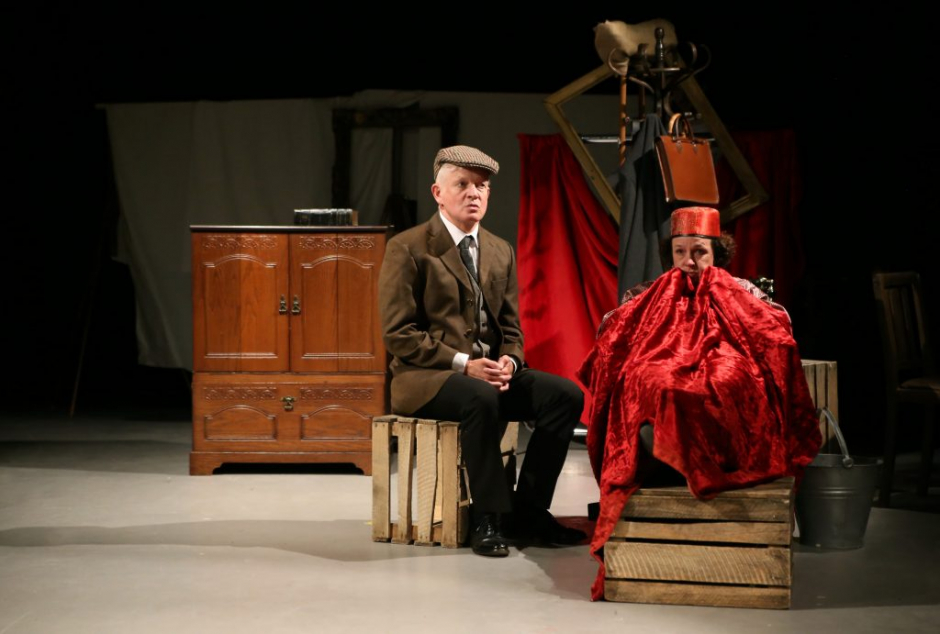The Trial, directed by Craig Sanders; HOME, January 16 2017.
There is much to admire in this impressive adaptation of Franz Kafka’s novel The Trial, adapted and performed by the young Manchester theatre company People Zoo Productions. Set on a stage piled with jagged mounds of junk, cupboards, empty picture frames, the production design recalls Kafka’s own artistic affinity with expressionism, as well as the great film adaptation of the novel by Orson Welles, whilst never feeling imitative of either. It also draws out Kafka’s influence on theatre. There is sometimes a feeling that we are watching a Beckett play as we laugh at the slapstick degradation of grotesques thrown onto the trash heap of modernity. Even the costumes feel as though they are decaying, as shirts and ties come undone and old fashioned trousers and braces look dusty.
For anyone who doesn’t know the story, Josef K. is arrested one morning for an unspecified crime and thrown into the nightmarish world of a legal system that seems to run parallel to the official legal system. The courtrooms are housed in the attics of poor tenement buildings, the judges are vain and lecherous, and the legal books are full of pornographic drawings. K. has a series of bizarre encounters with judges, lawyers, the court painter and others as he attempts to conduct a defence against an impenetrable system. There is the famous aspect of Kafka’s obsession with bureaucracy here, but the novel is also about philosophical and religious questions of guilt, about sexuality, about the line between the human and the animal and about the experience of living in the modern city.
Kafka was heavily influenced by theatre. The Man Who Disappeared [Amerika] ends with its protagonist joining the ‘Theatre of Oaklahama’ and other stories show an interest in performers of different types: Josefine the Singer and the Hunger Artist are two that spring to mind. Kafka was also close friends with the Yiddish Theatre actor Yitzchak Lowy. This adaptation is adept at capturing these theatrical elements of Kafka especially the importance of gesture and slapstick comedy. These elements are often neglected in the Anglo-American image of Kafka as a dour prosy writer of bureaucratic nightmares and we are ill-served by translations that are not able to bring out these elements sufficiently. Here though, characters adopt cartoonish gestures – limbs sprawl, poses are struck, faces are pulled into grotesque shapes. When the court officials arrest K. at the beginning the guards jump around like demented children and speak in ridiculous accents. K.’s landlady Frau Grubach emerges face first through a cupboard. The flogger who punishes court officials prances round like a matador before becoming a comic cockney. This is very much an ensemble work and it would not be fair to single out a particular actor. The performers, Amy Gavin, Matt Holt, Sarah Legg, William J. Holstead, Evelyn Roberts and Adrian Palmer, share more or less equal stage time and switch dizzyingly between various characters, adopting new accents and different physical shapes. These sudden changes in character in a small company tend towards the surreal impression of the staging. Everywhere Josef K. is surrounded by the same people who are also different.
The production also brings out certain elements of Kafka that are perhaps less explicit in his writing, particularly depictions of degrading and deviant sexuality. In one scene Josef K. opens a law book to sounds of orgasmic moaning from off stage that stop abruptly when he closes it. In another, centrepiece scene, Josef K. meets another client of his lawyer, a pathetic man called Block. In the novel, K. is disgusted by Block’s doglike subservience. On stage, Block, a pathetic giggling man with his shirt poking out his flies, is actually in a dog collar and led around by Leni, the lawyer’s servant, on a chain.
Where the production deviates from Kafka’s novel it is almost always successful. There is a funny running joke about eggs which, shared by several characters, seems to suggest everyone is in a conspiracy against K. There are also some amusing swipes at the bureaucracy of customer satisfaction and feedback reports. One of the biggest changes from the novel makes one of the most theatrically arresting moments in the play. K. goes to visit the court artist Titorelli who gives him advice on different forms of acquittal offered by the court. In the novel, on his way to Titorelli’s studio, K. is sexually taunted by three teenage girls on the stairs who are eventually shut out of Titorelli’s studio. Here the girls, scuttling, giggling, one of them hunchbacked, all speaking in a strange, high-pitched foreign accent, and singularly unsettling, are invited into the studio. Titorelli will only disclose information about the court if K. beats the three girls, one for each type of acquittal. After all, reasons Titorelli, if K. is innocent he will do anything to escape the court’s clutches. It is one of the most disturbing and powerful scenes I have seen on stage for some time. Titorelli jovial, the girls begging for mercy and K. crying as he continues to beat them. With work of this power People Zoo Productions are a company to watch out for.

